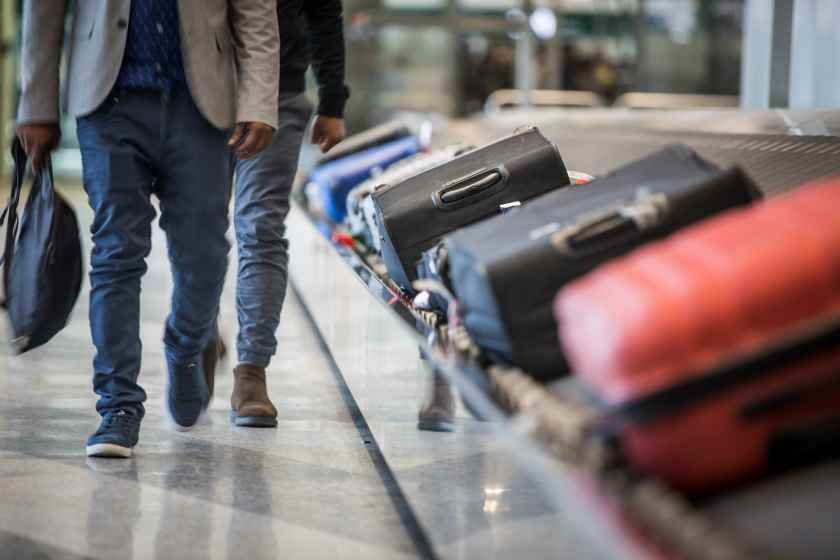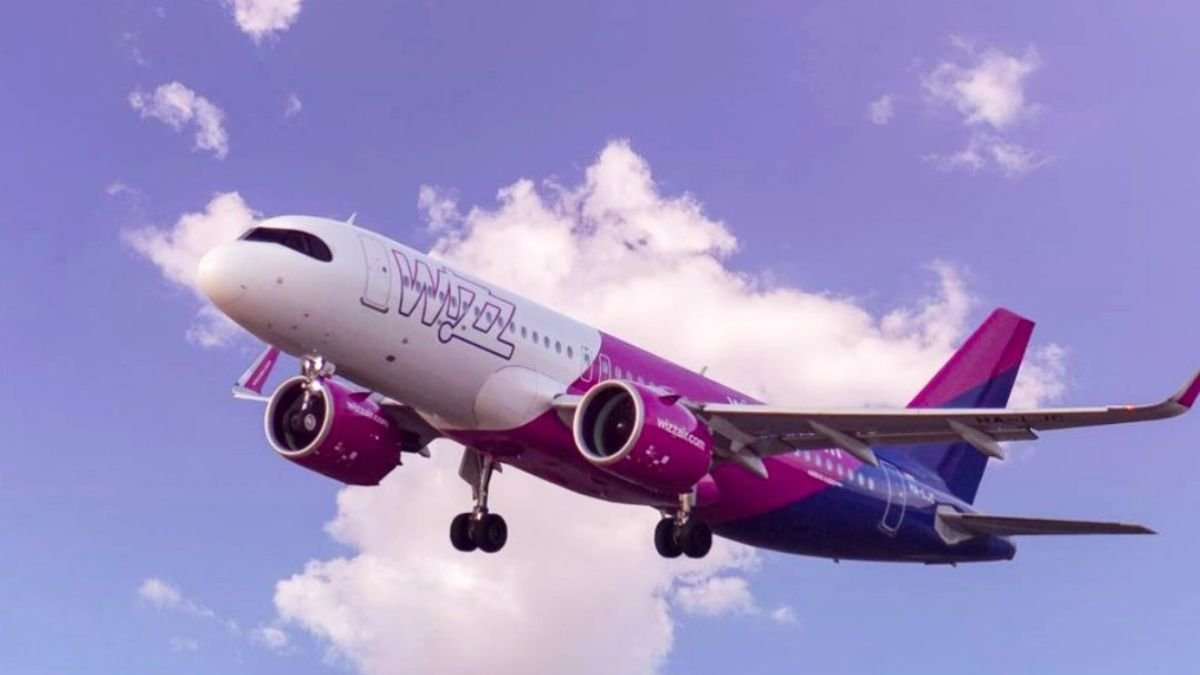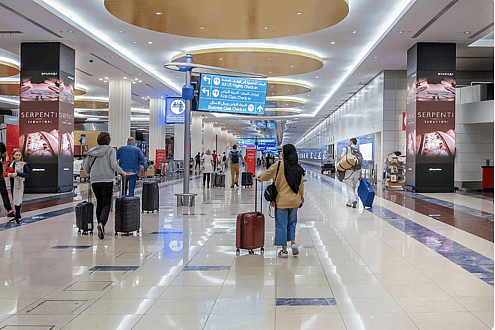Flight Buzz
UK Tourists Now Benefit from New Free Cabin Bag Policy on European Flights Amid Travel Regulation Changes

Saturday, July 26, 2025
UK holidaymakers will be able to take their hand luggage along with them under new legislation that was approved on 24 June 2025 which would permit passengers to take on a small carry-on bag weighing up to 7kgs (15.4lbs) at no additional cost. The measure, which applies to flights within the EU, is expected to put an end to the common policy of budget airlines like Ryanair and EasyJet of charging extra fees to fly with hand luggage. The new rule is intended to make flying as cheap as possible for passengers who want to bring just a small carry-on with them.
The new law comes in response to increasing demands by passenger rights organizations for more transparent, more consistent rules regarding carry-ons. New rules are likely to have a significant impact on how airlines, in particular budget airlines, enforce cabin baggage regulations. Only relative recently, and frequently on budget airlines, did passengers start experiencing extra fees for their hand baggage, as strict baggage rules allowed companies to push their profits in that direction.
Details of the New Hand Luggage Policy
The new European Union law, which was voted in on June 24, permits passengers to bring one small carry-on bag weighing up to 7kg for no extra charge. So passengers can pack their most important items like clothing, electronics and toiletries without having to pay additional fees, as long as the bag does not exceed the weight limit.
Travellers accustomed to being charged extra for cabin bags will welcome the policy change. Budget airlines currently charge for hand luggage as an additional extra to the cost of a ticket, and have limitations on what size and weight a cabin bag can be. The change is aimed at making air travel regulations for holidaymakers traveling from the UK to Europe simpler and more tourist-friendly so that travellers can pack essential items without having to pay extra for additional baggage.
This new ruling comes into effect on all flights within the European Union, which means that airlines flying within the region will have to adhere by the new baggage rules. Many travelers will view this as a reprieve from the long-standing annoying and expensive baggage policies.
Ryanair’s Reaction to the New Proposal
The continued success of Ryanair which is one of the larger budget airlines, has been aided by the parasite class of consumer that has resulted from the enforced non-reserved seating policy. Ryanair’s chief executive, Michael O’Leary, condemned the ideas as “unimplementable.” Ryanair’s argument is that the notion of permitting all passengers to take two free belongings on board in the cabin, as some suggestions have proposed, is unworkable. O’Leary argued there is not enough space on planes and implementing these types of rules would drastically interfere with flight operations.
Ryanair, which has built a business around its luggage policies, including extra fees for the carry-on bags of those who are not priority passengers, has argued that the new policies might result in full overhead compartments and cause the boarding process to grind to a halt. O’Leary’s remarks echo of worries about just how the policy could be applied across the entire market for EU aviation if it were engaged in full flow.
Ryanair also notes that allowing passengers to bring several bags on board for free could possibly violate the rights of airlines to set their own pricing and baggage rules. Ryanair has said this could eliminate the competitive pricing which has seen budget airlines boom, providing cheap travel for millions of passengers.
Implications for UK Holidaymakers and European Travel
The significance of this new hand baggage policy is huge for UK holidaymakers if for no other reason than, increasingly, those with a passion for cheap flights to Euro resorts are usually fans of budget airlines. This amendment will help to make things easier for the travelers by providing a bit of extra flexibility when traveling with the items they need and without any baggage fees.
For passengers travelling to popular European vacation spots like Spain, Italy, Greece and France, the new baggage rules will ease the check-in process and help to minimize any hassle of carrying luggage. No longer will travelers have to resort to cramming everything into smaller luggage or paying exorbitant fees for carry-on items. What is more, for those on short hauls or short breaks, this move could make the travel experience in general (if you have a small luggage requirement) that bit more pleasant.
While airlines will now need to adapt to this new law, we should be able to look forward to more consistent guidelines and better enforcement in how carry-on is treated across European airports. This is especially perfect for familes and solo travelers who like to travel light and avoid the anxiety of the check-in process when it comes to lugging a lot of extra things.
The Impact on Budget Airlines and Competitive Pricing
Budget airlines have a reputation for their bargain basement fares and strict baggage policies. The new rule, which lets passengers carry free of charge a small carry-on bag, offers both opportunities and challenges for these carriers. The rule is likely to make flying less expensive and more tourist-friendly, but it also presents logistical challenges for the airlines, which depend on fees for checked luggage and other services.
For many low-cost carriers, including Ryanair, this rule may lead to a review of baggage policy and price. Budget carriers benefited from charging for baggage and other amenities, and the new rule could cut into their overall business model. But how these policies will be enforced is likely to be carrier dependent, and predicated upon how individual airlines shape their service in response to the new DOT rules.
Looking Ahead: Future Travel Trends in the EU
It is anticipated that it could be the start of a new trend in travel across the entire EU as new hand baggage rules set in place. The move to permit free cabin bags on all flights could therefore lead to other changes in how airlines operate the handling of baggage and on-board services. It could also create a model for other areas, tempting similar policy changes in countries whose airlines otherwise employ heavy bags fees as an important part of their revenue structures.
For UK holidaymakers visiting Europe, it should mean a better deal and an end to rip-off costs, all in line with the wider transformation we’re trying to drive in aviation on issues0such as fairer flights for all and easier travel. As the new regulations increasingly take hold, travelers are sure to face fewer disruptions and more consistent messaging around baggage rules, making European travel more accessible and less stressful.
(Source: BBC, Travel Weekly, and Ryanair earnings call)
Flight Buzz
UAE Residents Rush To Book Wizz Air Budget Flights From Just AED204 Before September Exit

Abu Dhabi travellers aren’t wasting any time. With Wizz Air set to stop flying from the capital on September 1, 2025, residents are racing to grab whatever low-cost tickets are left. One-way fares start at just AED204, and for many, it’s the last chance to enjoy a budget-friendly trip before the airline pulls out of the UAE.
UAE Travellers Scramble For Wizz Air Deals Before Flights Stop In September
Your next adventure just got better!🎉 Travel between July 14th and Sep 30th, and enjoy 15% OFF on selected flights. Time to plan that getaway!🗺️https://t.co/RDiSCj4sYj pic.twitter.com/ehYZTnKv21
— Wizz Air (@wizzair) July 9, 2025
For a lot of UAE travellers, especially those based in Abu Dhabi, Wizz Air wasn’t just another airline; it was the one that made spontaneous trips possible. No extra fuss, no steep fares. If you wanted to escape for a few days without spending a fortune, it usually had you covered. A few days in Georgia? Last-minute plans to visit Armenia? Wizz Air made it doable without draining your wallet.
Now, as the airline prepares to stop operations, people are scrambling to book what could be their final trip with it. August flights are disappearing fast, with many travellers eager to make the most of these last few weeks. For fans of the airline, it’s not just about a flight; it’s a chance to revisit the freedom and spontaneity it offered, one more time.
The Most Popular Routes Flying Off the Charts
Ticket prices are doing much of the talking. These are the current one-way fares leaving from Abu Dhabi:
- Kutaisi, Georgia – AED204
- Yerevan, Armenia – AED264
- Baku, Azerbaijan – AED254
- Tashkent, Uzbekistan – AED314
- Almaty, Kazakhstan – AED404
For a lot of travellers, hopping over to Yerevan or Baku has often been more budget-friendly than spending a weekend in Dubai. That’s one big reason why flights are vanishing fast.
Almaty and Tashkent weren’t always on people’s travel lists. That’s slowly shifting now. With Wizz Air getting ready to close shop, there’s a noticeable rush. People are booking quickly, and by the looks of some travel sites, August flights are already starting to fill up.
What This Means For Travellers In The UAE
Now that it’s pulling out, the impact is real. People who once relied on those low-cost flights to lesser-known destinations are feeling the gap. The usual weekend getaway may soon come with a higher price—or fewer choices altogether. Travel experts say it’s best not to wait. Prices are climbing and availability is shrinking, with the final weeks expected to see the biggest surge in bookings.
Whether another budget airline will fill the gap remains to be seen. But for now, it’s all about squeezing in one last trip before Wizz Air officially takes off for good.
Cover Image Courtesy: Wizz Air/X
For more such snackable content, interesting discoveries and the latest updates on food, travel and experiences in your city, download the Curly Tales App. Download HERE.
First Published: July 27, 2025 11:21 AM
Flight Buzz
The Sabre: Hypersonic Plane Could Revolutionize Tourism with One Hour Flights from London to New York

Sunday, July 27, 2025
Red swap Icon – black travel across the world where time means the most valuable of assets — a revolution in interconnected international travel has made its connections. The Sabre, a hypersonic plane under development in the U.K., would reduce the time of the flight between London and New York to an hour from the current seven. What is already a super-sonic achievement also has the potential to change the face of the tourism industry if it means cutting down the time it takes to cross the Atlantic. The plane, poised to hit speeds of Mach 5 (five times the speed of sound), is being developed as part of the European Space Agency’s (ESA) Invictus programme, with a planned flight demonstration scheduled for 2031. Exciting as the news is, this leads to pondering on what the tourist industry is going to do in light of this major shift in traveling behavior.
Changing the times of travel and the dynamics of tourism
Few among travelers, business people and the aviation sector haven’t dreamed for decades of shortening the duration of flights between two of the world’s most-visited cities, London and New York. These cities are connected by commercial flights today in about 7 hours, but with the Sabre, that travel time can be significantly reduced to only 1 hour. This has profound implications for the international tourism industry. A cut in flight time of that level won’t just make international travel faster—it will make it easier.
Tourism is based upon the same convenience, and long flights tend to keep tourists apart from one another in terms of geography. Many travellers from Europe, for example, are put off by the long flight times to the US, just as American travellers take a similarly dim view of a trip to Europe. By blanketing the ocean, the Sabre would make it possible for people to travel across the Atlantic for a more convenient day trip, supporting a greater number of one-day pleasure trips rather than long-stay commitments, and injecting money into the New York and London economies.
Reviving International Tourism: Is a New Travel Trend Emerging?
Perhaps the most important thing the Sabre can do for tourism is to make last minute international travel for short periods more possible for more people. Today, long-haul flights are considered a significant commitment of time and resources. Ordinary New York–London travel is seven hours’ flight travel time plus extra hours for check-in, security, and other non-stroll-on-the-grass necessities. Shrinking that time to a mere hour means a visit from the average tourist — for a day or a weekend or even one business meeting — is never more than a few hours of travel away.
And reduced transit time might encourage a surge in weekend travel, as tourists could more easily hop between cities. Let’s say, for example, the New Yorker starts taking spur-of-the-moment weekend trips to London or the other way around. This could mean a good opportunity for cultural interchange between two great cities and their periphery. It might also make it so other cities can benefit from shortened travel windows, with the potential for travelers to more effortlessly pop on a hypersonic plane to take in several destinations as part of the same travel package, bringing international travel within the reach of a whole new group of travelers and would-be travelers.
Economic Effects: The Rise of Hypersonic Tourism
The arrival of the Sabre could unlock new opportunities for businesses in the tourism industry. As flights are reduced, the luxury of high-speed travel may grow in popularity, similar to the way premium class seats on hypersonic jets, as well as for private charters and more customized travel plans. London and New York airports could also experience an influx in passenger numbers, lured by the one-hour flight.
A hypersonic tourism boom could, however, come with challenges. It could have a dramatic impact on existing transportation modes, like long-haul commercial flights. Airlines that currently dominate the transatlantic sector would find their territory challenged by hypersonic jets, and would be forced to innovate and cut costs in order to stay competitive. This may lead to cheaper flights for passengers, driving even more accessibility to the world of travel. But the cost of running hypersonic jets could be higher at first, meaning tickets may be more expensive in the near term.
In addition, since people can travel more quickly now, visit-och-place-h. new ways— The advent of more efficient travel options could mean tourists want more out of their destinations, and cities would have to offer higher-quality experiences in less time. Tourist areas could be overrun with visitors over shorter duration even as demand for lodging, dining and services peak. This is great news for tourism, but it also means you need to have the infrastructure in place so you don´t end up trashing the town!
Technological Innovation and Sustainability of Hypersonic Transportation
In addition to the speed, the Sabre’s novel technology might also change air travel in more far-reaching ways. The plane has advanced cryogenic technology that allows it to handle the high temperatures produced by hypersonic flight. The cooling system, which rapidly cools the air rushing into the engine to reduce engine temperatures, is critical to keeping the aircraft flying in a state of readiness that could exceed 4,000 miles an hour.
These types of technology have potential to lead to even more developments in aviation. As a leap forward, the Sabre itself is promising, but other countries and companies are also developing hypersonic aircraft. This push and pull of competition in the still nascent industry might mean an ever faster and greener airplane in the works. As these advances continue, we could very well see a more sustainable mode of long-distance travel that would make air travel’s carbon footprint a thing of the past!
Obstacles to overcome: High cost, and safety issues
But there are still a few hurdles to clear before the Sabre becomes a commercial reality. Cost is one of the biggest obstacles. The aircraft is believed to cost around GBP 6 billion to develop and, though the technology promises much, it may be years before it becomes commercially viable. Safety, too, is a big issue, for such aircraft undergo tremendous friction and thermal strain. The cryogenic pre-cooler system, developed for Sabre, is fundamental to the engines, but the extended life reliability of this now fundamentally validated technology has to be demonstrated when at the ready to bear the continual day in day out use of commercial aviation.
Meanwhile, the environmental impact of doing so is still poorly understood. Faster travel also could mean less fuel used per trip, but the vast amount of energy such high speeds requires could mitigate that gain, the report found. But there will be a need for even more disruption if the Sabre is to be a viable form of sustenance for people who do not want to ride a camel.
A New Era for Global Tourism
Looking to the future, this hypersonic Sabre jet is ushering in a new age of international travel. The Sabre’s ability to revolutionize air travel, by cutting down travel time and allowing for spontaneous international trips, as well as luxury travel at high speeds, is truly mind blowing. The next 10 years will be critical to whether this technology can make good on its promises and to whether it will be accessible to more than just the premier travelers.
As it stands, the future of hypersonic travel is just over the horizon. But as the engineering, innovation and infrastructure keeps advancing, the Sabre may one day change the face of tourism, connecting cities, cultures and economies at the speed of sound.
Flight Buzz
Dh204 airfare: UAE residents rush to book budget trips before Wizz Air exits Abu Dhabi

With fares starting as low as Dh204, UAE residents are scrambling to book last-minute holidays before Wizz Air ceases operations from Abu Dhabi on September 1, 2025.
The airline’s shutdown has triggered a surge in travel bookings to popular budget-friendly destinations, including Georgia, Armenia, Azerbaijan, Uzbekistan, and Kazakhstan.
A Khaleej Times review of fares for August shows one-way economy flights from Abu Dhabi priced at:
-
Dh204 to Kutaisi (Georgia)
-
Dh264 to Yerevan (Armenia)
-
Dh254 to Baku (Azerbaijan)
-
Dh314 to Tashkent (Uzbekistan)
-
Dh404 to Almaty (Kazakhstan)
Stay up to date with the latest news. Follow KT on WhatsApp Channels.
For many UAE residents, these ultra-low fares have made short getaways accessible and affordable. But with Wizz Air’s imminent departure, frequent flyers fear this era of budget-friendly international trips may soon become a thing of the past.
“It’s rare to find international tickets for Dh204,” said Prachi Mehta, an Indian expat and graphic designer at a media agency in Dubai.
“I checked fares for Georgia and found return tickets for under Dh550. Since my daughter’s school is on break and my husband can take leave too, we are planning one last trip on Wizz Air before they stop flying.”
She shared that her family had postponed a summer trip to Delhi due to expensive fares. “This deal came at the right time, a chance to explore a new country at a low cost.”
For Mohammed Shoib Khan, a 34-year-old Pakistani engineer living in Ajman, the low-cost airline has been a game changer. “I have travelled twice to the Caucasus with friends, but couldn’t take my family because they weren’t in the UAE then,” he said. “Now that they have joined me here, I want to take them on a quick holiday before prices go up.”
With Wizz Air’s exit on the horizon, some residents are already hunting for affordable alternatives. “We are planning to travel to a new destinations before my wedding in December. We have been looking out for options of low-cost airline. Hopefully, the travel is affordable in the month of September or October,” said Mohammed Ootom, a Jordanian expat who lives in Al Nahda, Sharjah.
The sales manager at a retail store in Sahara Centre recalled how the airline enabled spontaneous travel for him and his friends. “Once, we booked a trip to Azerbaijan while sitting at a café. It cost us less than a staycation in the UAE,” Mohammed said.
“Budget airlines like Wizz Air gave many people the chance to explore new countries without breaking the bank. We need more low-cost carriers to keep that dream alive,” he added.
-

 Brand Stories6 days ago
Brand Stories6 days agoBloom Hotels: A Modern Vision of Hospitality Redefining Travel
-

 Brand Stories23 hours ago
Brand Stories23 hours agoCheQin.ai sets a new standard for hotel booking with its AI capabilities: empowering travellers to bargain, choose the best, and book with clarity.
-

 Destinations & Things To Do7 days ago
Destinations & Things To Do7 days agoUntouched Destinations: Stunning Hidden Gems You Must Visit
-

 AI in Travel7 days ago
AI in Travel7 days agoAI Travel Revolution: Must-Have Guide to the Best Experience
-

 Brand Stories3 weeks ago
Brand Stories3 weeks agoVoice AI Startup ElevenLabs Plans to Add Hubs Around the World
-

 Brand Stories2 weeks ago
Brand Stories2 weeks agoHow Elon Musk’s rogue Grok chatbot became a cautionary AI tale
-

 Destinations & Things To Do20 hours ago
Destinations & Things To Do20 hours agoThis Hidden Beach in India Glows at Night-But Only in One Secret Season
-

 Asia Travel Pulse3 weeks ago
Asia Travel Pulse3 weeks agoLooking For Adventure In Asia? Here Are 7 Epic Destinations You Need To Experience At Least Once – Zee News
-

 AI in Travel3 weeks ago
AI in Travel3 weeks ago‘Will AI take my job?’ A trip to a Beijing fortune-telling bar to see what lies ahead | China
-

 Brand Stories3 weeks ago
Brand Stories3 weeks agoChatGPT — the last of the great romantics













You must be logged in to post a comment Login